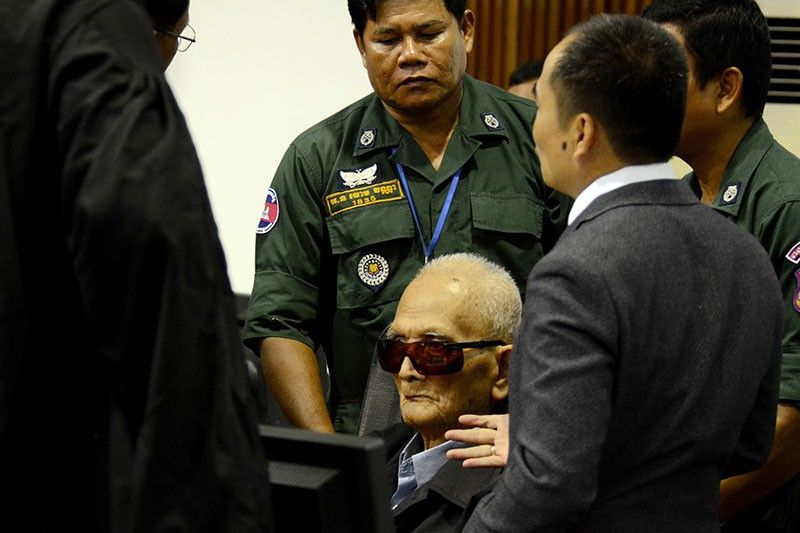Khmer Rouge leaders found guilty of genocide in landmark ruling

PHNOM PENH, Cambodia — Two top leaders of Cambodia's Khmer Rouge regime were found guilty of genocide on Friday, in a landmark ruling almost 40 years after the fall of a brutal regime that presided over the deaths of a quarter of the population.
The Khmer Rouge's former head of state Khieu Samphan, 87, and "Brother Number 2" Nuon Chea, 92, are the two most senior living members of the ultra-Maoist group that seized control of Cambodia from 1975-1979.
The reign of terror led by "Brother Number 1" Pol Pot left some two million Cambodians dead from overwork, starvation and mass executions but Friday's ruling was the first to acknowledge a genocide.
The defendants were previously handed life sentences in 2014 over the violent and forced evacuation of Phnom Penh in April 1975.
But Friday's judgment at the Extraordinary Chambers in the Courts of Cambodia (ECCC) also found Nuon Chea guilty of genocide against the ethnic Vietnamese and Cham Muslim minority group, among a litany of other crimes.
"The chamber finds that Nuon Chea exercised ultimate decision-making power with Pol Pot and... therefore finds Nuon Chea is responsible as a superior for all the crimes," presiding judge Nil Nonn said.
"This includes the crime of genocide by killing members of Cham ethnic and religious group."
Khieu Samphan was also found guilty of genocide against ethnic Vietnamese, though not against the Cham, he added.
Both parties were sentenced to "life in prison", merging the two sentences into a single term, Nil Nonn said.
Hundreds of people, including dozens of Cham Muslims and Buddhist monks, were bussed into the tribunal, located in the outskirts of Phnom Penh to attend the hearing.
Cambodia's 'Nuremberg'
The events covered by the verdict span the four years of the Pol Pot regime, and include extensive crimes against humanity.
"The verdict is essentially the Nuremberg judgement for the ECCC and thus carries very significant weight for Cambodia, international criminal justice, and the annals of history," said David Scheffer, who served as the UN secretary general's special expert on the Khmer Rouge trials from 2012 until last month.
The revolutionaries who tried to recreate Buddhist-majority Cambodia in line with their vision of an agrarian Marxist utopia attempted to abolish class and religious distinctions by force.
Forced marriages, rape, the treatment of Buddhists, and atrocities that were carried out in prisons and work sites throughout the country fall under the additional list of charges—which the two men were found guilty of as well.
"(The verdict) will affirm the collective humanity of the victims and give recognition to the horrible suffering," said Youk Chhang, head of the Documentation Center of Cambodia—a research organization that has provided the court with evidence.
It could also "provide a sense of closure to a horrible chapter in Cambodian history".
The hybrid court, which uses a mix of Cambodian and international law, was created with the backing of the UN in 2006 to try senior Khmer Rouge leaders.
Only three people have been convicted by the court, which has cost more than $300 million.
Former Khmer Rouge foreign minister Ieng Sary and his wife died without facing justice, while "Brother Number 1" Pol Pot passed away in 1998.
The number of allegations against Nuon Chea and Khieu Samphan was so vast the court split the trials into a series of smaller hearings in 2011.
Many believe Friday's decision will be the last for the tribunal, which has been marred by allegations of political interference.
Prime Minister Hun Sen—himself a former Khmer Rouge cadre—has repeatedly warned he would not allow more investigations to proceed, citing vague threats to stability.
The court has launched investigations into four more Khmer Rouge cadres, though one was dismissed in February 2017, highlighting the difficulties of bringing lower level members of the brutal regime to justice.
Scheffer said that "challenges of efficiency, funding, and access to evidence" are issues that plague all international criminal courts, but argued the successes of the Cambodian tribunal should not be diminished.
- Latest
- Trending

































